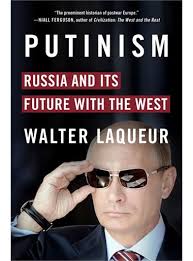 “Putinism” has long been a hot topic in the West, where the term – describing the policies and practices of Russian President Vladimir Putin – is generally met with a combination of fear and disapproval. But, among Russia’s ruling elite, Putinism is viewed as a complex and attractive ideology – one that could outlast its namesake, argues Dmitry Oreshkin, an independent Moscow-based analyst, and the author of Dzhugashvili and the Soviet Statistical Epic.
“Putinism” has long been a hot topic in the West, where the term – describing the policies and practices of Russian President Vladimir Putin – is generally met with a combination of fear and disapproval. But, among Russia’s ruling elite, Putinism is viewed as a complex and attractive ideology – one that could outlast its namesake, argues Dmitry Oreshkin, an independent Moscow-based analyst, and the author of Dzhugashvili and the Soviet Statistical Epic.
Russia, like the Soviet Union, should be an “ideocracy,” ruled by a sanctified minority that propels the country toward some goal that is fully known only to them, according to Kremlin-approved fascist philosopher Aleksandr Dugin and Putin confidante Vladislav Surkov. Not surprisingly, this concept has been embraced by the siloviki, powerful former and current state-security officers who view themselves as something of a fraternity – what Stalin described as a kind of “order of swordsmen,” he writes for Project Syndicate:
Not only does Putinism guarantee the continued dominance of the siloviki; it also precludes accountability. If only the ruling class can comprehend Russia’s higher purpose, only its members can evaluate their performance. They decide when their colleagues should be removed or replaced, and how the country’s resources, including labor, should be used – whether to boost economic growth and raise living standards or to consolidate the ideocracy.
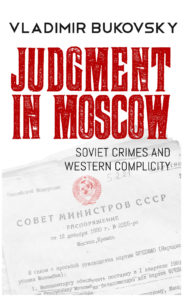 The late former Soviet dissident Vladimir Bukovsky’s warnings about not making common cause with despotism are needed more than ever today, adds Garry Kasparov, the founder of the Renew Democracy Initiative and the chairman of the Human Rights Foundation. As he wrote in “Judgment in Moscow,” “The voice of conscience whispers that our fall began from the moment we agreed to ‘peaceful coexistence’ with evil.” We have fallen far indeed, and the voice of Vladimir Bukovsky will always be with us to hold up the mirror of history to anyone proclaiming the need to find common ground with dictators, he writes for the Post.
The late former Soviet dissident Vladimir Bukovsky’s warnings about not making common cause with despotism are needed more than ever today, adds Garry Kasparov, the founder of the Renew Democracy Initiative and the chairman of the Human Rights Foundation. As he wrote in “Judgment in Moscow,” “The voice of conscience whispers that our fall began from the moment we agreed to ‘peaceful coexistence’ with evil.” We have fallen far indeed, and the voice of Vladimir Bukovsky will always be with us to hold up the mirror of history to anyone proclaiming the need to find common ground with dictators, he writes for the Post.
Bukovsky was “one of the most effective political warriors of the Cold War,” according to one observer. For his part, Bukovsky called National Endowment for Democracy-sponsored projects in the Soviet Bloc “the only hope for our friends behind the Iron Curtain in their struggle for freedom.”
Galina Ackerman, a Russian émigré writer and translator in Paris who worked closely with Mr. Bukovsky in Resistance International, an anti-Communist organization set up in the 1980s, described him as “the great thinker of the whole Soviet dissident movement — the most resolute and politically clearheaded,” The Times adds.
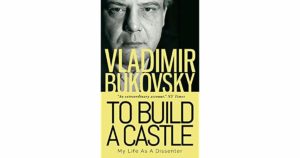 Mr. Bukovsky, she said, “had a better vision than anyone of what was needed to weaken the Soviet regime.” …“Bukovsky’s heroic speech to the court in defense of freedom and his five years of martyrdom in a despicable psychiatric jail will be remembered long after the torturers he defied have rotted away,” the exiled Russian novelist Vladimir Nabokov wrote in 1974.
Mr. Bukovsky, she said, “had a better vision than anyone of what was needed to weaken the Soviet regime.” …“Bukovsky’s heroic speech to the court in defense of freedom and his five years of martyrdom in a despicable psychiatric jail will be remembered long after the torturers he defied have rotted away,” the exiled Russian novelist Vladimir Nabokov wrote in 1974.
How did a country with an economy the size of Spain, corruption on a par with Papua New Guinea and life expectancy below Libya win such geopolitical clout? The Economist asks.
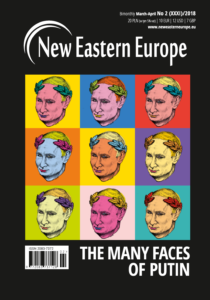 Understanding Russia’s perspective on democracy is central to a comprehension of Moscow’s views and approach to foreign policy, argues Anna Mahjar-Barducci, Director of the Russian Media Studies Project. For Russia, democracy, or more accurately liberal democracy, is merely a system that was imposed by the West, in an attempt to assert a uniform system of values, she writes for MEMRI, in the first in a series of analyses, presenting the thinking of intellectual circles close to the Kremlin:
Understanding Russia’s perspective on democracy is central to a comprehension of Moscow’s views and approach to foreign policy, argues Anna Mahjar-Barducci, Director of the Russian Media Studies Project. For Russia, democracy, or more accurately liberal democracy, is merely a system that was imposed by the West, in an attempt to assert a uniform system of values, she writes for MEMRI, in the first in a series of analyses, presenting the thinking of intellectual circles close to the Kremlin:
Sergey Karaganov[1], former foreign policy advisor to Russia’s Presidential Administration (2001-2013) and a dean at the prestigious Higher School of Economics, explains that this is wishful thinking. The disintegration of the Soviet Union created a decade-long illusion that the era of ideologies and ideological struggle was over and that the world was moving inexorably towards Western liberal democracy and capitalism. “Europe and America fascinated the world with their freedom and their winning political system. The perception of the final victory of Western values was backed up by America’s massive military supremacy, but, most importantly, by the Western countries’ affluence that everyone, including the Soviet and Russian people, desired. This desire was sustained by a widely spread and [widely] cultivated view that wealth and prosperity were a result of democracy, not vice versa.” Karaganov analyzes in an article, titled “New Ideological Struggle?”(Izvestiya, April 21 2016).[2]
“Western capitalism’s model of a society based on near-universal affluence and liberal democracy looks increasingly ineffective compared to the competition,’ Karaganov writes. “The authoritarian countries’ middle classes may push their leaders toward greater democracy, as in Russia, but Western democracies will also likely become more authoritarian.” RTWT
 In his autobiography, first published in Russian in 1977 and later reissued in English under the title “To Build a Castle: My Life as a Dissenter,” Mr. Bukovsky compared his struggle to that of a Russian bear pursued by hunters, The Times adds:
In his autobiography, first published in Russian in 1977 and later reissued in English under the title “To Build a Castle: My Life as a Dissenter,” Mr. Bukovsky compared his struggle to that of a Russian bear pursued by hunters, The Times adds:
The bear, eager to grab a piece of carrion they had placed in a tree as part of a trap, keeps getting hit in the head by a block of wood while reaching for it. The bear eventually falls unconscious from the tree. That, Mr. Bukovsky wrote, “is an approximate description of my relations with the powers that be.”
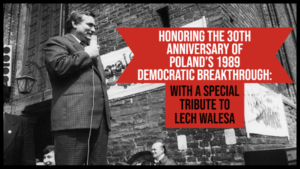 A C-Span discussion on democratic revolution in hosted by the National Endowment for Democracy, featuring the following speakers, is available here.
A C-Span discussion on democratic revolution in hosted by the National Endowment for Democracy, featuring the following speakers, is available here.
- Vladimir Bukovsky, Representative Center for Democracy->U.S.S.R.
- Carl Gershman, President, National Endowment for Democracy
- Janos Kis, Editor, Beszcelo (Hungary)
- Jacek Kuron, Adviser, Solidarity Trade Union
- Vilem Precan, Director, Czech Documentation Center
- John Richardson, Chair, National Endowment for Democracy
- Dante B. Fascell, U.S. Representative [D] Florida
- Tom Lantos, U.S. Representative [D] California







